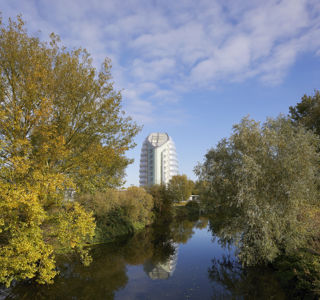
Introducing Our New Chair of Trustees
- 20th Dec 2023
- Author: Elliott Langley - Marketing Administrator
Our Space is all about getting to meet the people who work at the National Space Centre, who contribute to the many different moving pieces that happen behind the scenes. For this entry, I was really lucky and had the opportunity to meet our new Chair of Trustees, Stuart Martin.
This year sees our previous Chair of Trustees, Prof Sir Martin Sweeting, beginning a well-deserved retirement. After a long process of interviewing prospective candidates for the role, we are delighted to welcome Stuart Martin to the National Space Centre. Stuart is a space industrialist who has been Chief Executive of the Satellite Applications Catapult for ten years. I was very excited to talk about to Stuart about his incredible career up to this point, what he plans to bring to the National Space Centre charity and what he is most excited about as he begins his new role.
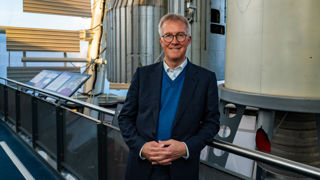
Thanks for joining me Stuart. Let’s start off with your background. What has brought you to the National Space Centre?
Well, I grew up as a child of the Seventies, and my first memory is actually of the Apollo era and the moon landings. So even as a child I was very inspired by space. In school I was always interested in maths and science, and it led to me wanting to pursue a career in space. I went on to do a degree in physics at Imperial College, London. Back then I was sure that if I ever wanted to work in the space industry, then I would need to go to America. It seemed like that was the only option in those days. In my final year at Imperial I was all set to submit my applications for graduate studies in the US, when I happened to see that a company called Logica was hiring for space roles in Germany. Interesting, I thought, this will give me some useful experience and a chance to save up some money. I postponed my America plans for a couple of years. I ended up spending the next 5 years in Germany, and 23 years with Logica. Whenever I considered moving on, something interesting would always come up, or a new opportunity would appear… so in the end, I never did make it to the US!
Instead, I became a part of the emerging space industry here in the UK. Over the years, I held a wide variety of roles at Logica, both technical and management. I ended up being responsible for all space activities worldwide and a team of 500 people. I feel tremendously lucky to have had that opportunity and I loved every moment of it. By 2012 I had led the space business for 7 years, by far the longest I had ever held any job. So I was starting to think about what I wanted to do next. In this role I’d spent time working with government and the UKSpace trade association on a new strategy for space, and the idea was forming to create the Satellite Applications Catapult. When this happened, I was delighted to be appointed the founding Chief Executive, which was an amazing job that I did for nearly 11 years before I departed at the end of October.
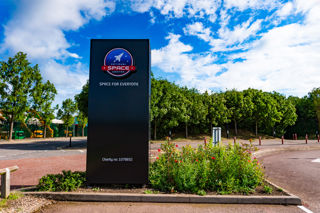
What made you decide to move on from that position?
Catapult is a wonderful environment to work in. It is a culture of innovation and an environment that inspires forward thinking, so it is constantly changing and evolving. I think 10 years is enough time for any one person to lead in that kind of environment. It was time for somebody else to inject some new thinking, and introduce new approaches to the infinite challenges of being a Catapult. And it was time for me to move on too, and explore some new opportunities. This is when I learned of the Chair of Trustees role at the National Space Centre. I have been aware of the charity from its early days as a Millenium Project, and visited many times. So I already knew something of its mission and purpose. But after speaking with Chas (CEO at the National Space Centre) and Prof Sir Martin Sweeting (the previous Chair of Trustees), I realised just how much the values and objectives of the National Space Centre aligned with my own and it made me very excited to have the opportunity to be part of the team. It’s great to see how the National Space Centre has become such a vibrant and important institution, both to the Leicester region and nationally. I have huge respect for Sir Martin, and am very excited to carry on his work.
On that subject, what does it mean to be a Chair of Trustees?
Well, I’m still learning that myself! Another thing I like about the role is that it’s something that I’ve not done before. It’s a chance to learn new skills. Essentially the Trustees need to “take care” of the Centre and the charity. We need to make sure that the Charity is well run and fully supported; for example, ensuring that all legal obligations are complied with, and that charitable objectives are agreed and delivered. One of the strengths of the National Space Centre is that we’re so clear about our mission. One of my first tasks will be to review our skills matrix amongst the Trustees to ensure we have the right blend of skills to support continued evaluation of our mission and charitable objectives. We have to make sure we have people with knowledge of all the different aspects of our environment relevant to our mission, and understand the challenges the Charity faces. And that’s exciting. It’s already a strong board that I’m joining, so I want to look at what more we can offer the teams and how can we make sure they have all the tools and support they need.

What do you want to achieve during your time as Chair of Trustees?
I definitely want to focus on increasing the scope of our charitable objectives and looking after the resilience of the institution. Our IGNITE! Community projects are doing great at delivering our charitable objectives to young learners in Leicestershire, so I’m particularly keen to support this and would love to do more. But, like all charities, costs are always a challenge and we have big investments in the upkeep of our facilities that we need to plan for. I want to look at how we can create a systematic funding programme to ensure the future needs of the Centre are met, whilst at the same time meeting and expanding our charitable objectives. The space industry is going in so many different directions at the moment, and the role of the National Space Centre is growing ever more important.
What do you like about the National Space Centre so far?
I’m still only really scratching the surface of everything that we do, and I know there is a lot more I need to discover. But I have already learned is that the team is brilliant and the facilities are amazing. This is very evident from the looks on children’s faces you see as they walk around the galleries – they’re inspired and in awe. There’s really nothing else like it in the UK.
Our activities in the community are also first class and so important. The way that the National Space Academy uses space to reach people who perhaps don’t appreciate the value of STEM is unique and has so many benefits. For the individual who can unlock a new world of opportunity, for the space sector that needs an informed public and skilled workforce, and also for the country as a whole where there is such a chronic shortage of STEM skills. There really is nothing else like the National Space Centre. There is so much untapped potential in our young people to contribute to the space sector and the economy. They just need to be shown the opportunities available to them and the difference they can make. It’s a huge challenge, but an exciting one that the National Space Centre is already making a big contribution to.
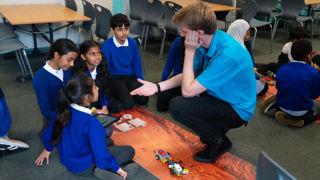
How will you be different from previous Chairs?
Sir Martin was in the role for many years, and together with Chas and the rest of the board navigated successfully through some challenging times. He will be a very hard act to follow. It’s hard to say how I will be different, as I wasn’t around to see how he did it. But I’m sure there will be differences. I certainly hope to be very present and visible in the Centre. Not that I’m saying previous Chairs weren’t doing this also, but it’s important to me to be available and be known to the team that I am there to offer support.
What’s most interesting about space to you?
I’ve worked my entire career in the space industry, but I have to say that I’m actually not particular geeky about space or into science fiction. Even back in the day I was always more interested in how to make space commercially sustainable, by making better make use of the space environment to help solve problems on earth. That said, I’ve also always been interested in the way that space has been used as a symbol of national prestige and the role it has played in geopolitics. How we can take advantage of that potential in the future? How can we harness people’s knowledge of space as an inspirational force to engage people who aren’t that interested? How can we make more use of space as a tool? Space is so fascinating because there are so many different dimensions to it. It means so many different things to different people.
What does ‘Space for Everyone’ mean to you?
‘Space for Everyone’ captures perfectly everything that the National Space Centre stands for. If you think that space has absolutely nothing to do with you, then ‘Space for Everyone’ challenges that belief in a friendly way and opens up a conversation about how space is relevant to every person on this planet. It’s a culturally galvanising statement that helps people to think. It’s an idea that the National Space Centre will come to own. I also think it is an important way to engage with parents in particular. They might think that space is interesting, but they might not see it as something that is directly relevant to the prospects of their children. ‘Space For Everyone’ helps both children and their parents to think about their future careers and shows that it’s valuable to learn about it now in the present.
Any words of advice to someone looking to get into STEM?
Just go for it! You will never be closing off opportunities if you do. Pursuing STEM subjects means only ever opening new doors for the future. If you put it off or stop pursuing it then it’s harder to get back into it again later. If you think it even might be for you, then please don’t close it off now. As someone who studied STEM subjects to degree level and then made a career of it, I can tell you that STEM subjects only get more interesting the longer you pursue them.
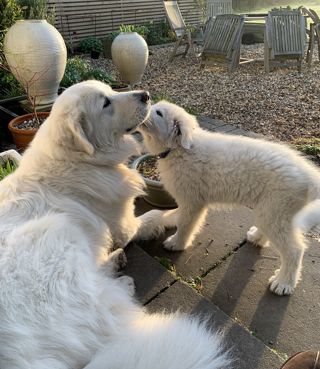
What’s your perfect Sunday?
I have two large dogs, so I always start a Sunday with them on a long walk. Then quite often it’s a round of golf followed by a nice dinner. Golf tends to take place over Sunday lunchtime, but it means I’m usually ready for a good dinner in the evening!
Is Pluto a planet?
No… it’s a cartoon dog.
I’ve noticed you both have Martin in your name… is that a prerequisite for being a Chair of Trustees?
I don’t think that it’s a requirement. But I do like to think it is a good indicator of quality!
If you were an actual chair, what kind of chair would you be?
Ah, a very philosophical question! I would be a comfortable armchair. These days I tend to favour comfort over speed!
Any Christmas Plans?
We are having some building work done on the house at the moment, so I don’t think we will be in a fit state for visitors. So I imagine it will be a quiet one with my wife, dogs and cats. Lots of dog walking… and maybe a bit of golf!

